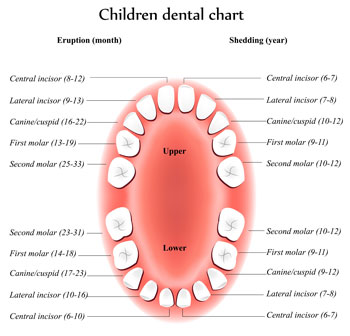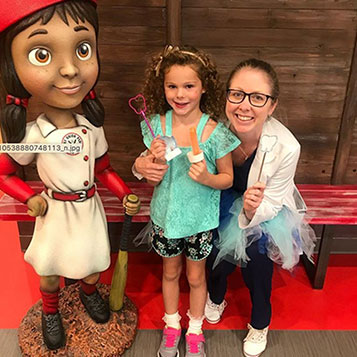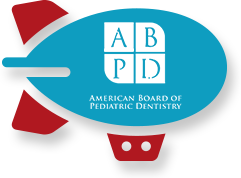Below are common questions and our answers about the best way to care for children’s teeth.
When should I schedule my child’s first visit to the dentist?
We recommend that you make an appointment to see the dentist as soon as your child gets his first tooth. The American Academy of Pediatric Dentistry recommends that children be seen with the eruption of the first tooth, or at one year of age, whichever comes first.
What Is A Pediatric Dentist?
As pediatric dentists, Dr. Greenhill, Dr. Jennison and Dr. Britt have two extra years of specialized training after dental school, which is dedicated to the oral health of children from infancy through the teenage years. This training includes extensive training on caring for children with special healthcare needs, as with different treament modalities. The very young, pre-teens, and teenagers all need different approaches in dealing with their behavior, guiding their dental growth and development, and helping them avoid future dental problems. The pediatric dentist is best qualified to meet these needs.
Why Are The Primary Teeth Important?
It is very important to maintain the health of the primary teeth. Neglected cavities can and frequently do lead to problems which affect developing permanent teeth. Primary teeth, or baby teeth are important for (1) proper chewing and eating, (2) providing space for the permanent teeth and guiding them into the correct position, and (3) permitting normal development of the jaw bones and muscles. Primary teeth also affect the development of speech and add to an attractive appearance. While the front 4 teeth last until 6-7 years of age, the back teeth (cuspids and molars) aren’t replaced until age 10-13.
Eruption Of Your Child's Teeth

Children’s teeth begin forming before birth. As early as 4 months, the first primary (or baby) teeth to erupt through the gums are the lower central incisors, followed closely by the upper central incisors. Although all 20 primary teeth usually appear by age 3, the pace and order of their eruption varies.
Permanent teeth begin appearing around age 6, starting with the first molars and lower central incisors. At the age of 8, you can generally expect the bottom 4 primary teeth (lower central and lateral incisors) and the top 4 primary teeth (upper central and lateral incisors) to be gone and permanent teeth to have taken their place. There is about a one to two-year break from ages 8-10 and then the rest of the permanent teeth will start to come in. This process continues until approximately age 21.
Adults have 28 permanent teeth, or up to 32 including the third molars (or wisdom teeth).
What happens during my child’s first visit to the dentist?
The first visit focuses on getting to know your child. Dr. Greenhill, Dr. Jennison or Dr. Britt will check your child’s teeth for placement and health, and will look for any potential problems with the gums and jaw. One of the hygienists will cleaning your child's teeth. Sometimes, x-rays are taken. We will also answer any questions you have about how to care for your child’s teeth as they develop, and provide you with materials containing helpful tips that you can refer to at home.
How can I prepare my child for his first dental appointment?
The best preparation for your child’s first visit to our office is maintaining a positive attitude. Children pick up on adults’ apprehensions, and if you make negative comments about trips to the dentist you can be sure that your child will fear an unpleasant experience and act accordingly. Show your child the pictures of the office and staff on the website. Let your child know that it’s important to keep his teeth and gums healthy, and that the doctor will help him/her do that. Remember that Dr. Greenhill, Dr. Jennison and Dr. Britt are specially trained to handle fears and anxiety, and our staff excels at putting children at ease during treatment.
How often should my child visit the dentist?
We generally recommend scheduling checkups every six months. Depending on the circumstances of your child’s oral health, we may recommend more frequent visits.
Baby teeth aren’t permanent. Why do they need special care?
Although they don’t last as long as permanent teeth, your child’s first teeth play an important role in his development. While they’re in place, these primary teeth help your little one speak, smile, and chew properly. They also hold space in the jaw for permanent teeth. If a child loses a tooth too early (due to damage or decay) nearby teeth may encroach on that space, which can result in crooked or misplaced permanent teeth. Also, your child’s general health is affected by the oral health of the teeth and gums.
What’s the best way to clean my baby’s teeth?
Even before your baby’s first tooth appears, we recommend you clean his gums after feedings with a damp, soft washcloth. As soon as his first tooth appears, you can start using a toothbrush. Choose a toothbrush with soft bristles and a small head. You most likely can find a toothbrush designed for infants at your local drugstore.
At what age is it appropriate to use toothpaste to clean my child’s teeth?
Once your child has a few teeth, you can start using toothpaste on the brush. Until age three, use only a tiny amount of fluoride toothpaste (the size of a grain of rice) for each cleaning. Once you child turns three, you can switch to a pea sized amount of fluoride toothpaste. Encourage your child to spit after brushing. You should brush your child’s teeth for him/her until they have good fine motor skills, which usually happens around age nine.
What causes cavities?
Certain types of bacteria live in our mouths. When these bacteria come into contact with sugary foods left behind on our teeth after eating, acids are produced. These acids attack the enamel on the exterior of the teeth, eventually eating through the enamel and creating holes in the teeth, which we call cavities.
How can I help my child avoid cavities?
Be sure that your child brushes his teeth at least twice a day with fluoride toothpaste. Flossing daily is also important, because flossing can reach spots between the teeth that brushing can’t. Avoid sugary foods and drinks, especially juice, sports drinks, and sticky foods like fruit snacks. You also want to encourage your child to eat a variety of fruits and vegetables and limit frequent snacking. Finally, make regular appointments so that we can check the health of your child’s teeth and provide professional cleanings.
Does my child need dental sealants?
Sealants cover the pits and fissures in teeth that are difficult to brush and therefore susceptible to decay. We recommend sealants as a safe, simple way to help your child avoid cavities, especially for molars, which are hardest to reach. We often place sealants on the permanent molars. The first molars grow in usually around age 6 and the second molars around age 12.
My child plays sports. How can I protect his teeth?
Even children’s sports involve contact, and we recommend mouthguards for children active in sports. If your little one plays baseball, soccer, or other sports, ask us about having a custom-fitted mouthguard made to protect his teeth, lips, cheeks, and gums.
What should I do if my child sucks his thumb?
The large majority of children suck their thumbs or fingers as infants, and most grow out of it on their own. The effect of thumbsucking on permanent teeth is dependent on the frequency and intensity of your child's habit. If your child continues to suck his/her thumb after age three, it is more likely to cause problems with the positioning of the permanent teeth. If you have concerns about your child's habit, please discuss with us at your child's visit.
When should my child have dental X-rays taken?
Most children develop cavities between their teeth, and we do not know they are there without x-rays. We recommend taking X-rays once the molars start to touch, for most children this is around age four. Dr. Greenhill, Dr. Jennison and Dr. Britt take x-rays based on your child's cavity risk.


